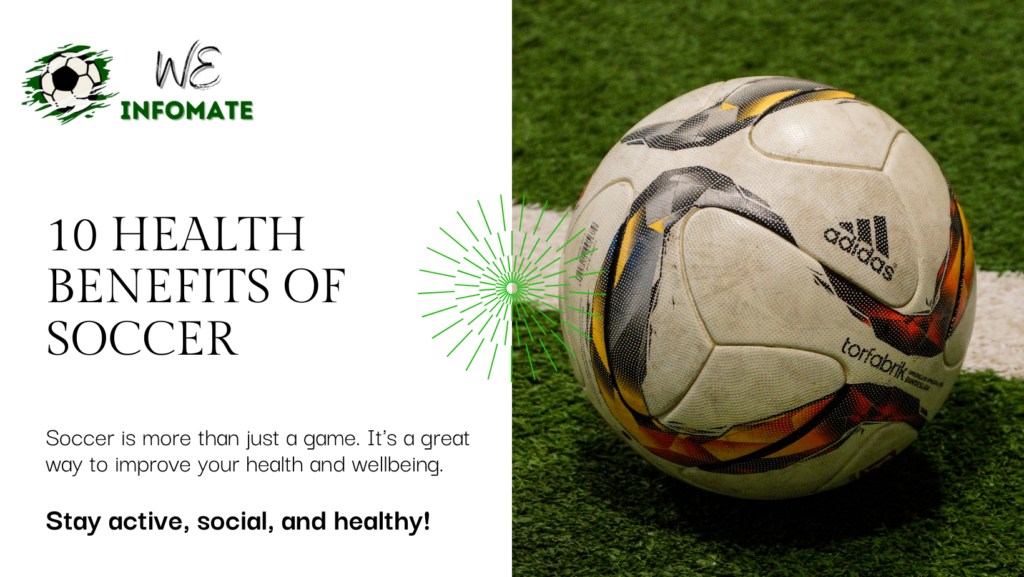Children of all ages are naturally drawn to sports. Soccer in particular offers a unique set of benefits for kids, from physical and cognitive development to enhanced social skills. This makes it an excellent choice for children seeking to get active and reach their maximum potential as athletes, but also allows children to engage in activities that will help prepare them truly excel throughout life.
Playing soccer offers children a great opportunity to stay physically active and develop essential skills such as determination, concentration, teamwork, coordination and discipline. The sport is suitable for all ages and can help improve not just fitness levels but learning too. From improved hand-eye coordination to psychological benefits, the value of soccer on children’s development should not be underestimated.
In this blog post we will take an in-depth look at some of the key benefits that playing soccer can provide for children’s overall health and development.

10 health benefits of soccer
- Improved Cardiovascular Health: Regular soccer play can strengthen the heart, reduce the risk of heart disease and improve the efficiency of the cardiovascular system.
- Enhanced Strength, Flexibility and Stamina: Soccer helps to build strength and enhances body flexibility due to its varied movements. It also builds stamina as it requires players to keep moving for an extended period.
- Improved Coordination: The sport demands good hand-eye and foot-eye coordination. Quick decisions require agile movements, helping improve motor skills.
- Better Cognitive Functioning: Soccer develops skills such as concentration, determination and strategic thinking, which can positively contribute to cognitive development.
- Reduced Stress and Improved Mood: Physical activity, like soccer, releases chemicals in the brain that make players feel happier and more relaxed.
- Increased Social Skills and Teamwork: Soccer is a team sport that requires cooperation and communication among players, fostering strong teamwork skills.
- Improved Discipline and Goal-Setting: The nature of soccer necessitates discipline, from following rules on the pitch to setting and working towards personal goals.
- Boosted Self-Confidence and Self-Esteem: Scoring goals, working hard for the team, and seeing improvements over time can significantly boost a child’s self-confidence and self-esteem.
- Sleep Improvement: Regular physical activity, like soccer, can help kids sleep better at night, which is crucial for their growth and development.
Obesity Prevention: Soccer is a great sport for burning calories and fat, thus playing a significant role in preventing obesity in children.

10 Social benefits of soccer
- Fostered Teamwork: Soccer encourages children to work together as a team. This exposure to collaborative play helps them understand the importance of teamwork and collectively working towards a common goal.
- Enhanced Communication Skills: Soccer demands clear and effective communication between teammates. This communication helps children express their ideas better and understand the viewpoints of others.
- Cultural Diversity Recognition: Soccer is a global sport that brings together children of diverse cultures and backgrounds. It provides an opportunity for children to develop an understanding of and respect for cultural diversity.
- Leadership Development: Playing soccer offers opportunities for children to develop leadership skills, as they often need to take charge, motivate their teammates and make strategic decisions.
- Sportsmanship: Soccer teaches children to play fair, respect the opponent, accept defeat gracefully, and celebrate victory humbly – all elements of good sportsmanship.
- Conflict Resolution: Inevitably, disagreements occur during the course of a game. Soccer provides a platform for children to learn how to resolve conflicts in a diplomatic manner.
- Community Engagement: Soccer clubs and teams often engage in community events and service, fostering a sense of community engagement and civic responsibility in children.
- Friendship and Bonding: Soccer provides a platform for children to make new friends, strengthening their social circles and creating bonds that often extend beyond the field.
- Discipline and Respect: Soccer instils discipline in children as they must follow rules, listen to their coach, and respect decisions made by authority figures such as referees.
Self-Expression: Soccer allows children to express themselves, displaying their style of play, creativity, and individual skills on the field. This can help boost their self-confidence and self-esteem.

Why is soccer good for your mental and physical health
Physical Benefits of Soccer
- Total Body Workout: Soccer engages all muscle groups, promoting overall fitness and muscle tone.
- Boosts Aerobic Capacity: Regular soccer play improves stamina, allowing players to run or walk for longer periods without getting tired.
- Improves Cardiovascular Health: The continuous nature of the game provides excellent cardiovascular exercise, keeping the heart rate up.
- Strengthens Bones: Regular physical activity like soccer can increase bone strength, which is particularly beneficial during childhood and adolescence, a critical period for bone development.
Mental Benefits of Soccer
- Improves Concentration: Soccer involves strategizing and quick decision-making, which can enhance focus and concentration.
- Reduces Stress and Anxiety: Physical activity reduces the body’s stress hormones. In turn, it stimulates the production of endorphins—chemicals in the brain acting as natural painkillers and mood elevators.
- Enhances Self-Confidence: Mastery of skills, winning games, and achieving personal goals in soccer can boost a player’s self-confidence.
Promotes Better Sleep: Regular physical activity like soccer can promote better sleep, which is crucial for mental health, cognitive function, and overall vitality.

Why is soccer important to me
Soccer is of great importance to me due to several reasons.
Firstly, it keeps me physically fit and mentally alert. The game’s dynamic nature provides a comprehensive workout, enhancing my physical endurance, agility and strength. Mentally, it sharpens my focus as making quick strategic decisions is a crucial part of the game.
Secondly, soccer allows me to build and foster relationships. Be it my teammates or opponents, the camaraderie developed on the field is unparalleled. It teaches me the value of teamwork and shared goals. Lastly, soccer serves as a stress reliever. Amid the hustle and bustle of life, the time spent on the field is therapeutic, helping to clear my mind and refresh my spirit.
Why is soccer important to the world
Soccer holds immense significance on a global scale, serving as much more than just a sport.
Firstly, it’s a universal language that transcends boundaries, uniting people across different cultures, nationalities, and backgrounds. The World Cup, watched by billions worldwide, is a testament to the game’s unifying power.
Secondly, soccer acts as an economic catalyst, contributing massively to the global economy through employment, tourism, and infrastructure development. It also opens doors for underprivileged individuals, with many soccer stars originating from humble beginnings.
Lastly, soccer has a profound societal impact. It fosters values such as teamwork, discipline, and respect, which are integral to individual and collective development. Soccer, thus, is not merely a game but a microcosm of the global community, encapsulating the essence of unity, opportunity, and value-based growth.
Conclusion:
In Conclusion, soccer is an intrinsic part of human life – providing physical and mental health benefits, fostering relationships, and having a profound global impact. For these reasons and more, it will continue to inspire generations for years to come.
FAQ’S
Q#1) Why is soccer a good sport for children?
Soccer is a great sport for children due to its numerous physical and mental benefits. It provides an excellent total body workout, improves cardiovascular health, and strengthens bones. Additionally, it teaches essential life lessons such as discipline, sportsmanship, and conflict resolution, helping children develop into well-rounded individuals.
Q#2) What do kids learn playing soccer?
Kids can learn a wide variety of skills while playing soccer. These include physical, mental and social skills such as improved agility & coordination, strategic planning, self-confidence, teamwork, respect for opponents and authority figures, sportsmanship, leadership and conflict resolution. All these skills are essential for success in life.
Q#3) What are some of the main benefits of playing soccer?Some of the main benefits of playing soccer include both physical and mental aspects. Physically, soccer provides a total body workout that improves cardiovascular health, increases stamina, and strengthens bones. It’s a sport that engages all muscle groups and enhances overall fitness. On the Mental side, soccer is known to boost concentration, reduce stress and anxiety, and enhance self-confidence. It encourages quick decision-making and strategic planning, skills that are beneficial both on and off the field. Socially, soccer promotes teamwork, sportsmanship, and leadership. It allows players to foster relationships, learn respect for opponents and authority figures, and resolve conflicts healthily.



